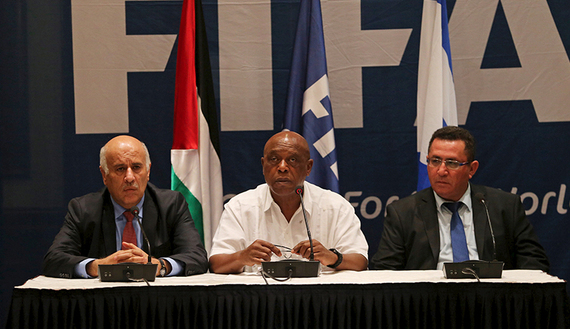By Andrew Warshaw
October 31 – The full extent to which FIFA washed its hands of football’s Israeli-Palestinian impasse by throwing out a detailed report from its chief mediator for the region can today be exposed.
Insideworldfootball has seen a copy of the much-debated report by South Africa’s Tokyo Sexwale (pictured centre with Palestines Jibril Rajoub on his left and Israel’s Ofer Eini on right) which covers several meetings between the various parties and lists a series of options and recommendations, all of which were rejected by FIFA’s all-powerful Council led by Gianni Infantino, in the process breaking the organisation’s own statutes.
Early in his presidency Infantino pledged that finding a solution to the Israel-Palestine dispute would be one of his main priorities. But last week, glibly citing the fact that Middle East tensions had been going on for 10,000 years, Infantino announced that Israel would not be sanctioned for its football-related conduct in the region and that “the matter is declared closed and will not be the subject of any further discussion until the legal and/or de facto framework has changed.”
The ruling after two years of negotiations provoked outrage among the Palestinians who viewed it as legitimising the five Israeli leagues clubs based in the Occupied Territories, the issue at the heart of the deadlock.
It is understood the Palestinian FA agreed with much of Sexwale’s report, only for it to be unceremoniously ditched after numerous delays and postponements.
All but conceding that painstaking attempts by Sexwale’s monitoring committee – set up by his predecessor Sepp Blatter to try and solve the stand-off between Israel and the Palestinians – had failed, Infantino told a press conference that that the issue went beyond football and that no more could be done by FIFA to bring the two parties together.
But this completely contradicts elements of Sexwale’s report which has not been released in full by FIFA even though it is in the public interest but which strongly urges FIFA to take action.
Israel has long argued that the clubs concerned are located in a territory that remains disputed according to the Oslo Accords and is under full political and military control of Israel. But early on in his report, Sexwale forcefully reminds FIFA that it should honour its own rules as well as abide by the stance of the United Nations which regards Israeli settlements – and by extension Israeli football teams that play in them – to be illegal.
“It is noteworthy that FIFA … should not be unmindful of its global obligations in terms of international law and relevant agreed-upon international protocols including its own statutes with regards to the promotion and development of football,” the report states, adding that the monitoring body was established “to find a football-related solution” to the five Israeli clubs “as well as the movement of players, officials and football equipment in, out and within Palestine.”
Later in the transcript, Sexwale cites no fewer than four FIFA statutes which are considered relevant including Article 3 which states that FIFA “is committed to respecting all internationally recognised human rights and shall strive to promote the protection of these rights” ; and, more significantly perhaps, Article 73 which states that “associations, leagues or clubs that are affiliated to a member association may only join another member association or take part in competitions on that member association´s territory under exceptional circumstances. In each case, authorisation must be given by both member associations, the respective(s) confederation and by FIFA.”
Then comes the most important and attention-grabbing part of the report: three specific options – one maintaining the current status quo; one suggesting discussions between Israel and Palestinian should be continued “based purely on football issues”; and a third – the most contentious of all – giving Israel six months to “desist administering football on the territories concerned”.
“Failure to find a resolution within this period shall mean that the matter will revert to the FIFA Council for final decision-making,” the report makes clear.
Insideworldfootball understands that Israel agreed with two of these options but opposed being shown what the text describes as a “yellow card”, a move that ultimately led to FIFA throwing out the report altogether, all the more surprising since parts of it had been watered down from a previous, more strongly-worded draft that recommended suspending Israel from FIFA until the situation was rectified.
In his summing-up, Sexwale urged FIFA not to get caught up in politics – which is ironically exactly why the process was closed down by Infantino and his inner circle.
“It must, as a football organisation, look essentially after the interest of football,” the report declared, revealing that despite all the bluster in public by both sides in the dispute there had been “a high degree of mutual respect …during the various deliberations.”
“The representatives of the IFA (Israeli Football Association) and PFA (Palestinian Football Association) within the committee have always tried to remain cool headed.”
Most tellingly of all, the report concludes: “What the FIFA leadership cannot any longer avoid is taking a decision on this matter.”
That, presumably, did not mean FIFA deciding to do nothing.
TOMORROW IN INSIDEWORLDFOOTBALL – SEXWALE SPEAKS OUT
Contact the writer of this story at moc.l1745255505labto1745255505ofdlr1745255505owedi1745255505sni@w1745255505ahsra1745255505w.wer1745255505dna1745255505


